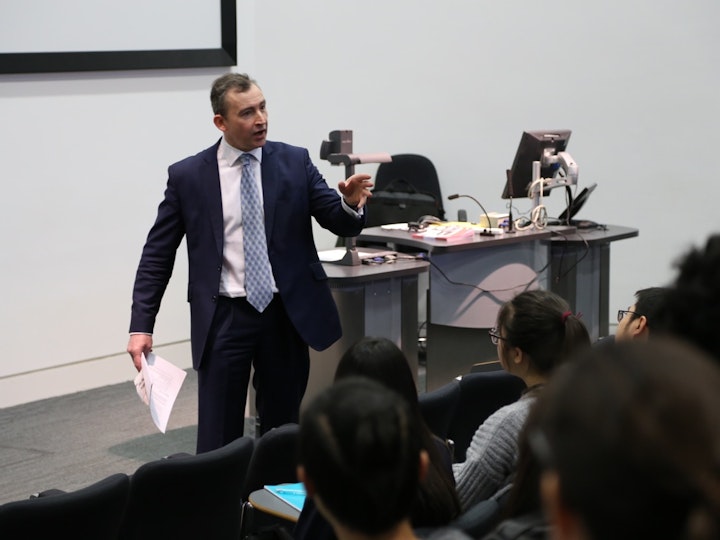Event: "The Impact of Brexit on the City" - Tim Skeet
The ICMA Centre hosted another talk as part of the "Industry Insights" series, this time with long-time banking expert and Visiting Fellow Tim Skeet. The talk, entitled ‘The Impact of Brexit’ on the City, proved to be both enlightening and somewhat hopeful for aspiring financial professionals such as myself and my peers. The talk covered many topics, primarily the causes of Brexit, communication deficiencies on the part of politicians and finance specifically, wider instability in the world and the risks all of this poses for finance, and more specifically finance in the City of London.

The ICMA Centre hosted another talk as part of the "Industry Insights" series, this time with long-time banking expert and Visiting Fellow Tim Skeet. The talk, entitled ‘The Impact of Brexit’ on the City, proved to be both enlightening and somewhat hopeful for aspiring financial professionals such as myself and my peers. The talk covered many topics, primarily the causes of Brexit, communication deficiencies on the part of politicians and finance specifically, wider instability in the world and the risks all of this poses for finance, and more specifically finance in the City of London.
Can you explain derivatives to your grandmother?
 A central concern raised by Mr Skeet was communication and how it affected Britain's decision to leave the European Union (EU). He echoed a common complaint against many people involved in the financial sector, which is that most people in society do not understand what finance is or how it works, and they don't trust the people who work in finance. Several times, the speaker asked members of the audience if they could explain derivatives or portfolio management to their grandmothers in a way they could understand. There were uncertain shrugs.
A central concern raised by Mr Skeet was communication and how it affected Britain's decision to leave the European Union (EU). He echoed a common complaint against many people involved in the financial sector, which is that most people in society do not understand what finance is or how it works, and they don't trust the people who work in finance. Several times, the speaker asked members of the audience if they could explain derivatives or portfolio management to their grandmothers in a way they could understand. There were uncertain shrugs.
Much of the decision to leave the EU was influenced, Mr Skeet argues, by British voters who arrived at their decisions based on limited information on very complex matters. Moreover there was a breakdown in the system of trust. People no longer trust experts, and the people they do listen to may be misleading. Mr Skeet even referenced the term "post-fact world", which is an uncomfortably common phrase these days. He suggested (perhaps correctly) that some of the people who voted to leave did so mainly to shake things up, to try something different, because their current situation wasn't working out for them. Addressing this theme, Mr Skeet struck a hopeful tone, and implored the audience to reach out and communicate with our friends, families, and fellow citizens to share the expert knowledge of the esoteric field of finance that we as students have acquired. Reengaging with the world is imperative.
Re-engaging with global citizens
Mr Skeet also spoke of the broader repercussions of the tendency for antagonism and hostility towards globalization and trade,. This has been evidenced by Brexit, the U.S. election results, and the rising popularity of populists such as Marine Le Pen in France, among others. One of my favourite quotes from the speaker was that "We should all become advocates for globalization, but carefully" and he is right. We, as people, skilled in something most citizens either do not understand or actively distrust, all have a responsibility to share our experiences and our knowledge with our peers.
 More specifically to London's financial sector, Mr Skeet was cautiously optimistic, suggesting that London would remain a global hub, though possibly in a diminished state. London has in the past done much of the financial work for the countries in the EU, such as clearing, settlements, and foreign exchange. One of the reasons that Mr Skeet is not full of doom-and-gloom is that "money, in theory, knows no boundaries". Even with the potential loss of passporting rights for banks in the UK (a feature used by American and Swiss banks to enter the European market via London), Mr Skeet believes that the City will continue to be a financial powerhouse.
More specifically to London's financial sector, Mr Skeet was cautiously optimistic, suggesting that London would remain a global hub, though possibly in a diminished state. London has in the past done much of the financial work for the countries in the EU, such as clearing, settlements, and foreign exchange. One of the reasons that Mr Skeet is not full of doom-and-gloom is that "money, in theory, knows no boundaries". Even with the potential loss of passporting rights for banks in the UK (a feature used by American and Swiss banks to enter the European market via London), Mr Skeet believes that the City will continue to be a financial powerhouse.
Ultimately, the talk can be summarised as touching upon several common themes; communication, the abstract nature of economics, the need to rebuild trust and to re-engage with global citizens. We were very glad to have had the opportunity to host such an illustrious speaker, and to have gained valuable insight into the causes and ramifications of Brexit.
Event writeup by MSc Corporate Finance student Cameron Pfiffer
| Published | 20 February 2017 |
|---|


